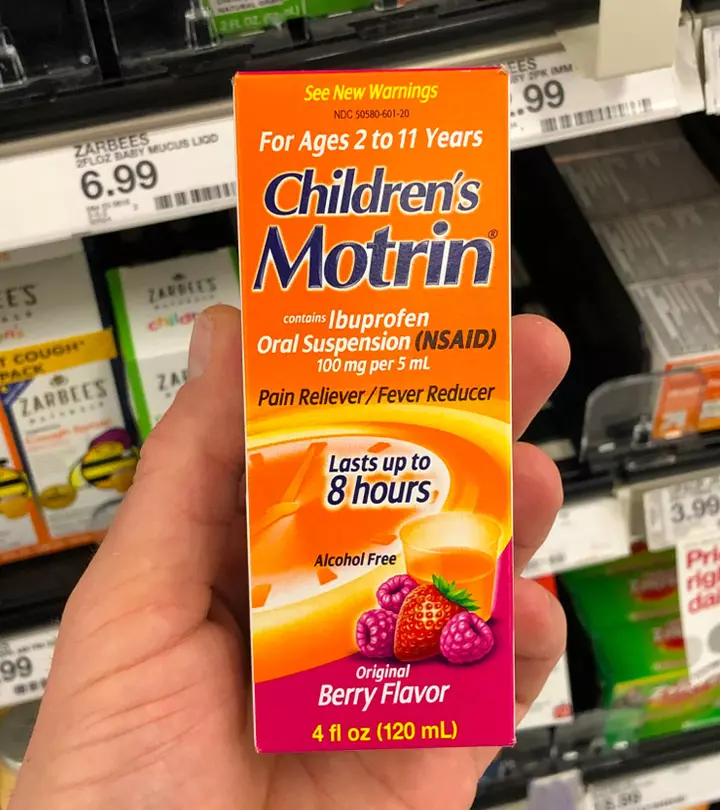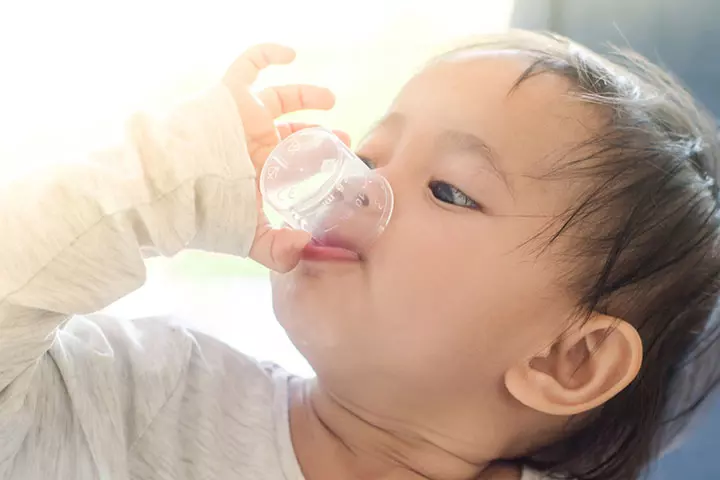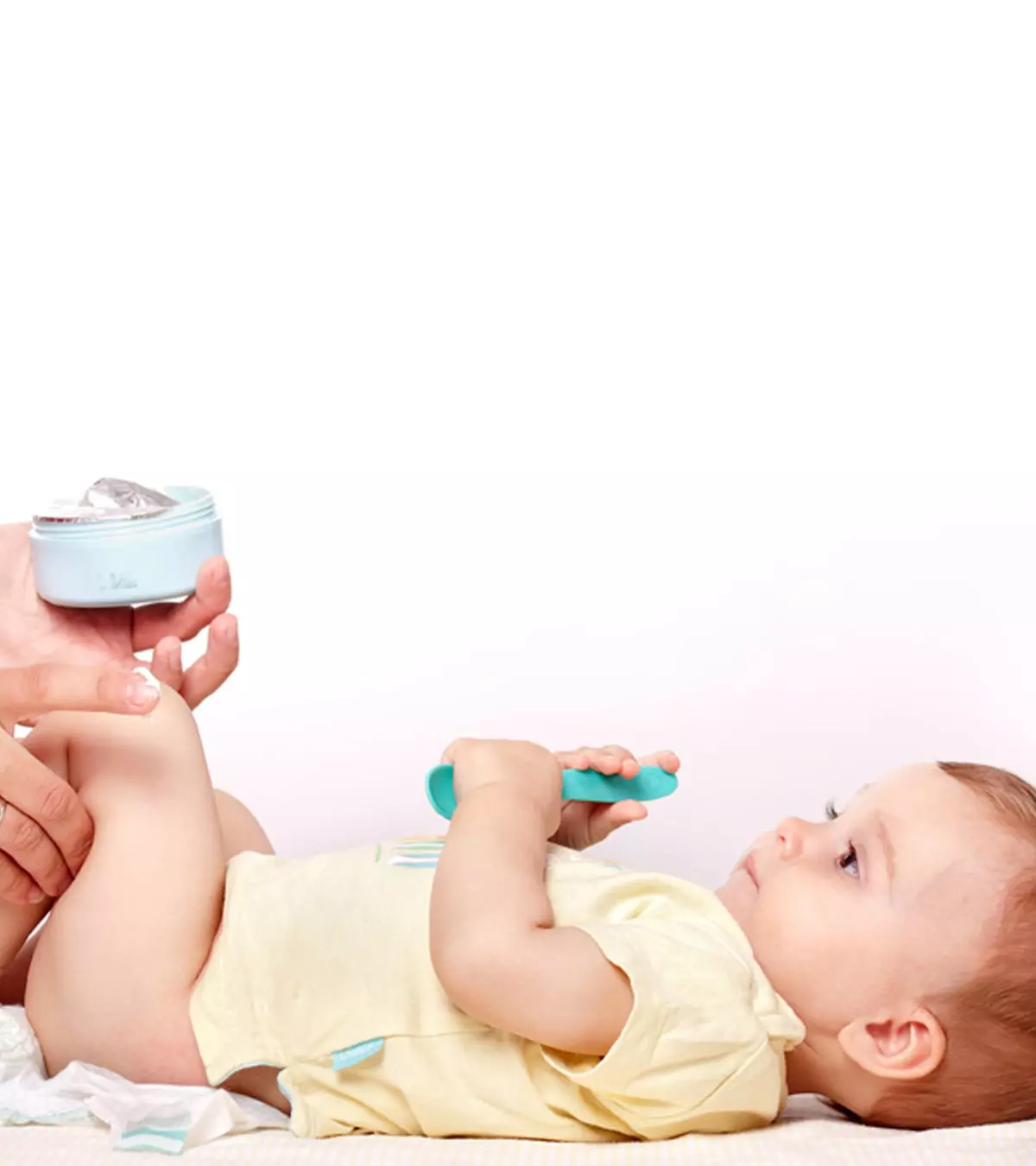
Image: Shutterstock
The pediatric version of Motrin for children is used to treat pain and fever. It is an over-the-counter pain relief medicine that contains Ibuprofen of the non-steroidal anti-inflammatory drug family. The working mechanism involves the interference of prostaglandin production. Prostaglandins are a group of compounds that induce swelling and pain following an injury (1).
Some other medicines, such as Nurofen, Ibugesic, and Brufen, also consist of the same drug as their main ingredient. Additionally, ibuprofen can also be used in combination with paracetamol.
Read on to learn more about Motrin, including its variants, safety for children, required dosage, and more.
Key Pointers
- Motrin is an over-the-counter medicine containing Ibuprofen for treating pain and fever in children.
- It has two variants: Infant’s Motrin (6-23 months) and Children’s Motrin (24 months-11 years).
- When taken as recommended, Motrin is safe and well-tolerated for short-term use.
- Ibuprofen should be avoided in children with allergies to ibuprofen or other drugs, asthma, liver/kidney problems, heart problem, or inflammatory bowel syndrome.
- Prolonged use of ibuprofen in children may cause side effects such as stomach bleeding, sore throat, and overdose symptoms.
- Careful attention to dosing instructions and prompt medical consultation in case of accidental overdosing is recommended.
What Are The Variants Of Motrin?
The Motrin brand of pediatric ibuprofen is available in two variants for children (2) (3).
- Infant’s Motrin: The manufacturer makes this version for infants of six to 23 months old. It is available in oral suspension (liquid) form only.
Tessa Rayanne, a mother of four, used Motrin to alleviate her baby’s teething pain. Sharing her experience, she says, “Our sweet little Cash (her baby) turned eight months old last week!… He has started to finally sleep through the night for 12 hours, but we still have plenty of nights when he wakes up once because his gums hurt. He has the four top teeth coming in all at once; the poor little guy fights through the pain each day, drooling, hands, and everything in the mouth to try to remedy it. We give him infant motrin if it gets bad; it’s really hard to see him in pain, so I give him lots of love and extra attention when he’s teething (i).”
- Children’s Motrin: It is meant for children from the age of 24 months to 11 years. You can buy this version either as a liquid or as a chewable tablet.
Each variant comes with guidelines about the dosage based on the weight of the child (4).
 Quick tip
Quick tipIs Motrin Safe for Children?
Motrin is a relatively safe analgesic to use for children, provided it is given within the prescribed dosage.
A clinical and safety review of the medicine showed that use of ibuprofen for kids has good safety and tolerability when used to manage mild to moderate pain for short-term (less than seven days) (5). Additionally, ibuprofen aids in providing relief from headaches, toothache, joint pain, and muscle pain and acts as a fever reducer.
Nevertheless, it is always important to talk to your child’s doctor before giving Motrin, especially if it is bought as a prescription-free medication and if you are considering using it for a child below two.
According to the US Food and Drug Administration (USFDA), the safety and effectiveness of Motrin suspension below the age of six months have not been established (6). Therefore, never give Motrin to a baby younger than six months, without doctor consultation.
What Is The Safe Age To Start Motrin Dosage?

Image: Shutterstock
Since the safety of the drug is not established among infants, it is ideal to consult a doctor before administering Motrin to babies and toddlers. The manufacturer recommends doctor’s consultation for using Children’s Motrin for children under the age of two years. Do not give ibuprofen more than four times in 24 hours without a discussion with your healthcare provider.
 Be watchful
Be watchfulInfant Motrin dosage chart as recommended by the manufacturer
| Weight | Age | Dose |
|---|---|---|
| NA | Under 6 months | Consult your doctor |
| 12-17lb (5.4-7.7kg) | 6-11 months | 1.25ml |
| 18-23lb (8.1-10.4kg) | 12-23 months | 1.875ml (2) |
Children’s Motrin dosage chart as recommended by the manufacturer
Oral suspension 100mg/5ml
| Weight | Age | Dose |
|---|---|---|
| Under 24lb (11kg) | Under 2 years | Consult your doctor |
| 24-35lb (11-15.9kg) | 2-3 years | 5ml |
| 36-47lb (16-21.9kg) | 4-5 years | 7.5ml |
| 48-59lb (22-26.9kg) | 6-8 years | 10ml |
| 60-71lb (27-31.9kg) | 9-10 years | 12.5ml |
| 72-95lb (32-43.9kg) | 11 years | 15ml (3) |
Chewable tablets 100mg/ chewable tablet
| Weight | Age | Dose (chewable tablets) |
|---|---|---|
| Under 24lb (11kg) | Under 2 years | Consult with your doctor |
| 24-35lb (11-15.9kg) | 2-3 years | 1 |
| 36-47lb (16-21.9 kg) | 4-5 years | 1 ½ (4) |
Note: This is a dosage chart indicated by the manufacturer, if your child’s doctor prescribes a different dosage, then you should follow it.
Who Should Not Take Ibuprofen (Motrin)?

Image: IStock
Ibuprofen may not be suitable for children:
- Known to have an allergic reaction to ibuprofen or have a history of drug allergies.
- Who have asthma, liver, kidney problems, heart problem, or inflammatory bowel syndromeiA chronic condition caused by a group of digestive tract disorders resulting in inflammation of the intestines. (7)
Make sure to tell your healthcare provider about all the medications your child is taking, as some drugs, such as blood thinners, steroids, antidepressants, or other NSAIDs, can interact poorly with Motrin and cause side effects (12).
Side Effects Of Motrin In Children

Image: Shutterstock
Motrin is generally well-tolerated by children; however, there could be a few side effects:
1. In some children, especially in those who are allergic to aspirin, ibuprofen can cause allergic reactions such as:
- HivesiA common skin rash causing itchiness due to certain foods or medications.
- Facial swelling
- Asthma
- Shock
- Skin reddening
- Rash
- Blisters
If you find any of these symptoms in your child, stop using the medicine, and seek medical consultation.

Image: Shutterstock
2. Ibuprofen might cause stomach bleeding if your child:
- Has a previous history of stomach ulcers or bleeding problems
- Is on an anticoagulant or a steroid drug
- Is taking other drugs containing NSAIDs (aspirin, ibuprofen, naproxen)
- Has taken Motrin for a long time
3. Severe sore throat accompanied by high fever, headache, nausea, and vomiting may occur in some children, especially under the age of three years when given for several days.
So, always consult your doctor before giving this medicine to your child; strictly follow the prescribed dosages and do not opt for non-prescribed medications (3).
Never give Ibuprofen to a child that might be dehydrated due to any reason, such as vomiting or diarrhea, without first seeing your healthcare provider.
 Point to consider
Point to considerSymptoms Of Motrin Overdose In Children
Accidental overdose of Motrin can cause adverse effects in children. Symptoms of Motrin overdose include:
- Nausea, vomiting, dyspeptic symptomsiIndigestion characterized by gas, heartburn, and abdominal pain. , and abdominal pain.
- Renal failureiA condition when the kidneys lose their capacity to filter wastes from the body.
- Generalized seizures, depressed level of consciousness and apneaiA sleep disorder causing breathing to repeatedly stop and start, leading to snoring and fatigue. (8)
- Slurred speech
- Leg swelling
- Trouble breathing
- Chest pain
If you are giving Motrin for the first time, then it is advised to carefully read the instructions and measure the dosage accurately to avoid overdosing your child. If accidental overdosing occurred and you noticed any of these symptoms, then take your child to the doctor.
Frequently Asked Questions
1. How often can I give Motrin to my child?
The dosage would be prescribed by your doctor. The manufacturer states that a dose could be repeated every 6-8 hours. But, it should not be given more than four times a day (2) (3).
2. Can I mix children’s Motrin with milk?
According to the NHS, you can give your child milk or juice straight after giving ibuprofen (Motrin). However, do not mix the medicine with juice or milk as the child may not get the complete dosage if they do not finish the drink (7).
3. What precautions do I need to take while giving Motrin to my child?
- Read the label on the drugs carefully and make sure you are buying the right strength medicine.
- Strictly adhere to the dosage prescribed by the doctor, measure the liquid syrup using the measuring device provided, and not kitchen spoons.
- If you ever missed a dosage, and if it is time for the next dose, then follow your original schedule, and never give double doses or back to back doses.
4. Can I give another painkiller along with Motrin?
It is not advised to give more than one painkiller at a time (unless suggested by your doctor). In such a case, paracetamol is the only painkiller that is safe to give along with ibuprofen. But, never give them without consulting with your doctor (7).
5. How long does it take for Motrin to kick in?
Ibuprofen (the active ingredient in Motrin) typically takes about 15 minutes to start working (9).
6. How long does children’s Motrin take to reduce a fever?
Ibuprofen should help your child feel better within 20-30 minutes. If children need to take it for more than three days without any improvement in the symptoms, you should consult a doctor, especially if they are under six months old and have been taking it for more than one day (10).
7. Can children’s Motrin be taken on an empty stomach?
Ibuprofen should be taken with either food or milk to prevent indigestion (11).
Motrin for children is prescribed for fever, inflammation, and pain management. It is the brand name of ibuprofen, and it is relatively safe if given in the right dosage. Although it is available over-the-counter, it is recommended to seek a pediatrician’s advice to know the proper dosage for your child. It is contraindicated if the child has a history of allergic reactions to the drug, heart problems, kidney problems, or asthma. Always keep the medication away from children and seek medical care for side effects or overdosing.
This post is for informational purposes only and is not a replacement for a doctor’s consultation. Do not use any medication without talking to your doctor.
Infographic: How Ibuprofen May Affect Stomach Functioning?
NSAIDs such as Ibuprofen have been found to affect the gastric mucosa adversely. Understanding these side effects may help devise strategies to reduce them. The infographic below enables you to get an insight.

Illustration: Momjunction Design Team
Discover proper guidelines for administering Advil/Motrin or Tylenol to ensure your child’s safety. Acquire accurate information regarding the appropriate usage and timing of these medications for your little one.
Personal Experience: Source
MomJunction articles include first-hand experiences to provide you with better insights through real-life narratives. Here are the sources of personal accounts referenced in this article.
i. My baby boy is 8 months old;https://tessarayanne.blogspot.com/2014/03/my-baby-boy-is-8-months-old.html
References
1. What is Motrin?; The Official Motrin Website
2. Infant’s Motrin; The Official Motrin Website
3. Children’s Motrin Oral Suspension; The Official Motrin Website
4. Motrin Dosing Charts for Children & Infants; The Official Motrin Website
5. Dipak J. Kanabar; A clinical and safety review of paracetamol and ibuprofen in children; NCBI(2017)
6. Motrin (Ibuprofen) Suspension 100mg/5ml; US Food and Drug Administration
7. Ibuprofen; National Health Service
8. Muhammed Ershad; David Vearrier; Ibuprofen Toxicity; NCBI
9. Treating my child’s pain or fever – paracetamol or ibuprofen?; NPS MedicineWise
10. About ibuprofen for children; National Health Service, UK
11. How and when to give ibuprofen for children; National Health Service, UK
12. Taking ibuprofen for children with other medicines and herbal supplements; National Health Service, UK
Community Experiences
Join the conversation and become a part of our nurturing community! Share your stories, experiences, and insights to connect with fellow parents.
Read full bio of Dr. Wayne Hough
Read full bio of shreeja pillai
Read full bio of Swati Patwal
Read full bio of Dr. Joyani Das



















